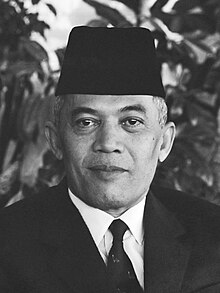
Back ابدول هاريس ناسوتيون ARZ Abdul Haris Nasution BCL Abdul Haris Nasution BTM Abdul Haris Nasution German Abdul Haris Nasution Spanish Abdul Haris Nasution Basque Abdul Haris Nasution Finnish Abdul Haris Nasution French Abdul Haris Nasution Hausa Abdul Haris Nasution ID
This article needs additional citations for verification. (January 2022) |
General of the Army (Ret.) Abdul Haris Nasution | |
|---|---|
 Portrait of Nasution, 1971 | |
| 2nd Speaker of the People's Consultative Assembly | |
| In office 20 June 1966 – 28 October 1972 | |
| President | |
| Deputy | See list
|
| Preceded by | Chaerul Saleh |
| Succeeded by | Idham Chalid |
| 11th Minister of Defense and Security | |
| In office 10 July 1959 – 22 February 1966 | |
| President | Sukarno |
| Preceded by | Djuanda Kartawidjaja |
| Succeeded by | Mas Sarbini |
| 3rd Chief of Staff of the Armed Forces of the Republic of Indonesia | |
| In office January 1962 – March 1966 | |
| President | Sukarno |
| Preceded by | ACM Soerjadi Soerjadarma |
| Succeeded by | General Suharto (1968) |
| In office December 1955 – July 1959 | |
| President | Sukarno |
| Preceded by | Maj. Gen. Tahi Bonar Simatupang (1953) |
| Succeeded by | ACM Soerjadi Soerjadarma |
| 2nd and 5th Chief of Staff of the Army | |
| In office 1 November 1955 – 21 June 1962 | |
| President | Sukarno |
| Preceded by | Maj. Gen. Bambang Utoyo |
| Succeeded by | Lt. Gen. Ahmad Yani |
| In office 27 December 1949 – 18 October 1952 | |
| President | Sukarno |
| Preceded by | Colonel Djatikoesoemo |
| Succeeded by | Maj. Gen. Bambang Soegeng |
| Personal details | |
| Born | 3 December 1918 Koetanopan, Mandailing, Dutch East Indies |
| Died | 6 September 2000 (aged 81) Jakarta, Indonesia |
| Resting place | Kalibata Heroes' Cemetery |
| Political party | Independent |
| Other political affiliations | IPKI (formerly) |
| Spouse |
Johanna Sunarti (m. 1947) |
| Occupation |
|
| Signature | |
| Nickname | Pak Nas |
| Military service | |
| Allegiance | |
| Branch/service | |
| Years of service |
|
| Rank | General of the army |
| Unit | Infantry |
| Commands | |
| Battles/wars | |
| Awards |
|
Abdul Haris Nasution (Old Spelling: Abdoel Haris Nasution; 3 December 1918 – 6 September 2000) was a high-ranking Indonesian general and politician. He served in the military during the Indonesian National Revolution and he remained in the military during the subsequent turmoil of the Parliamentary democracy and Guided Democracy. Following the fall of President Sukarno from power, he became the Speaker of the People's Consultative Assembly under President Suharto. Born into a Batak Muslim family, in the village of Hutapungkut, Dutch East Indies, he studied teaching and enrolled at a military academy in Bandung.
He became a member of the Royal Netherlands East Indies Army, but following the Japanese invasion, he joined the Defenders of the Homeland. Following the proclamation of independence, he enlisted in the fledgling Indonesian armed forces and fought during the Indonesian National Revolution. In 1946, he was appointed commander of the Siliwangi Division, the guerrilla unit operating in West Java. After the end of the national revolution, he was appointed Chief of Staff of the army, until he was suspended for his involvement in the 17 October affair. He was reappointed to the position in 1955.
In 1965, an attempted coup occurred, later officially blamed on the Communist Party of Indonesia. Nasution's house was attacked, and his daughter was killed, but he managed to escape by scaling a wall and hiding in the Iraqi ambassador's residence. In the following political turmoil, he assisted in the rise of President Suharto and was appointed Speaker of the People's Consultative Assembly. He had a falling-out with Suharto, who saw him as a rival, and he was pushed out of power in 1971. Once he was removed from positions of power, Nasution developed into a political opponent of Suharto's New Order Regime, though he and Suharto began to reconcile in the 1990s. He died on 6 September 2000 in Jakarta, after suffering a stroke and going into a coma. His body was interred at Kalibata Heroes' Cemetery.